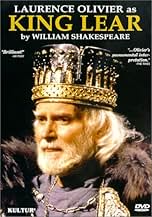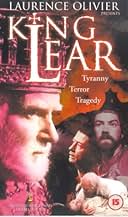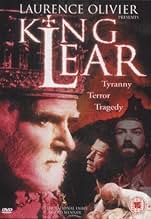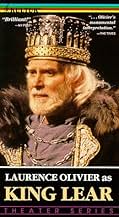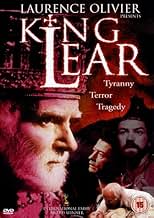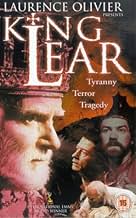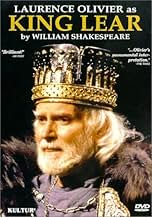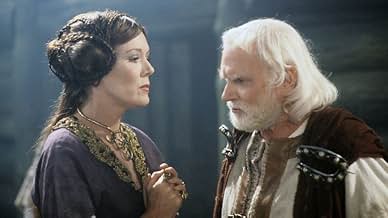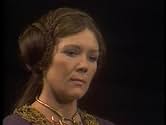Aging King Lear invites disaster when he abdicates to his two disloyal and obsequious daughters while rejecting the one who truly loves him.Aging King Lear invites disaster when he abdicates to his two disloyal and obsequious daughters while rejecting the one who truly loves him.Aging King Lear invites disaster when he abdicates to his two disloyal and obsequious daughters while rejecting the one who truly loves him.
- Won 1 Primetime Emmy
- 2 wins & 3 nominations total
- Director
- Writer
- All cast & crew
- Production, box office & more at IMDbPro
Featured reviews
The foremost Shakespearean actor of the 20th century took on what he considered his most challenging role when he did a television production of King Lear in 1983. Laurence Olivier said that because Lear is on stage so much of the time as the title character and is an old man, that it's an impossible role to play when you're young and starting out. And by the time you have the acting chops for the job you might just be too old to endure the rigors of playing it on stage.
Olivier had retired from the stage in the early Seventies and he would not take on the rigors of a play. But this televised production is his swansong to the immortal Bard. It's a tribute to Olivier's skill as an actor that he gets all the emotions going with Lear at once, pride, vanity, sorrow, and a bit of stupidity thrown in.
The story of the old king dividing his realm of Britain comes from the early days post the Roman occupation of Britain. Lear is a mythical king much as Arthur is from that period. His greatest sin is that he stayed around too long, he's in his eighties and his daughters have been waiting for their inheritance. The Eighties is a decent lifespan for any human, but in those days it was nothing less than remarkable someone would live that long.
Shakespeare also had a more recent example of a monarch giving up his power and dividing his realm. The great Emperor Charles V in 1555 gave up the Hapsburg empire which included both the Holy Roman Empire and the Kingdom of Spain and all the lands in the old and new worlds it possessed. Spain went to his son and the Holy Roman Empire went to his brother. They had their problems, but it was sure more peaceful than how it went with daughters Regan and Goneril played by Diana Rigg and Dorothy Tutin. As for Charles V, he lived the rest of his life peacefully in a monastery away from the cares of running a huge chunk of the world's real estate, dying in 1557.
There's a third daughter Cordelia played by Anne-Calder Marshall. When Lear the old fool asks each daughter how much they love him, the other two throw the flattery on with a shovel. Cordelia hesitates with her answer and gets banished in an arbitrary act. Absolute monarchs like Lear tend to act arbitrarily. That's part of the plot.
The secondary storyline concerns the Duke of Gloucester played by Leo McKern and his sons, one legitimate and the other out of wedlock. The legitimate one Edgar is played by David Threlfell and Edmund the illegitimate son is played by Robert Lindsay. Edmund is a calculating villain much like Iago in Othello. He manages to turn the Duke against Edgar, but he's after much bigger stakes than that, wooing Regan and Goneril behind their husband's back. It leads to war and a wholesale slaughter of the cast much like Hamlet.
Lear is a fool and has a fool played by John Hurt. Next to Olivier, he's the one you'll remember in the cast. Back in those days nobility were the only ones who could afford professional entertainment and the fool came on in his Harlequin outfit, say a few amusing things, but listen real close. Hurt sees an observes a lot and he's trying a few subtle suggestions to his master about the errors he made.
Set in ancient times King Lear's story is one repeated over and over again about staying in power too long, the resentments will build and the intrigues will follow. Shakespeare saw enough of that in his time both with his two monarchs Elizabeth I and James I. But he couldn't write about them lest his head be parted from his shoulders. I do wonder if some of the court politicians in those reigns saw a bit of themselves in King Lear.
Olivier had retired from the stage in the early Seventies and he would not take on the rigors of a play. But this televised production is his swansong to the immortal Bard. It's a tribute to Olivier's skill as an actor that he gets all the emotions going with Lear at once, pride, vanity, sorrow, and a bit of stupidity thrown in.
The story of the old king dividing his realm of Britain comes from the early days post the Roman occupation of Britain. Lear is a mythical king much as Arthur is from that period. His greatest sin is that he stayed around too long, he's in his eighties and his daughters have been waiting for their inheritance. The Eighties is a decent lifespan for any human, but in those days it was nothing less than remarkable someone would live that long.
Shakespeare also had a more recent example of a monarch giving up his power and dividing his realm. The great Emperor Charles V in 1555 gave up the Hapsburg empire which included both the Holy Roman Empire and the Kingdom of Spain and all the lands in the old and new worlds it possessed. Spain went to his son and the Holy Roman Empire went to his brother. They had their problems, but it was sure more peaceful than how it went with daughters Regan and Goneril played by Diana Rigg and Dorothy Tutin. As for Charles V, he lived the rest of his life peacefully in a monastery away from the cares of running a huge chunk of the world's real estate, dying in 1557.
There's a third daughter Cordelia played by Anne-Calder Marshall. When Lear the old fool asks each daughter how much they love him, the other two throw the flattery on with a shovel. Cordelia hesitates with her answer and gets banished in an arbitrary act. Absolute monarchs like Lear tend to act arbitrarily. That's part of the plot.
The secondary storyline concerns the Duke of Gloucester played by Leo McKern and his sons, one legitimate and the other out of wedlock. The legitimate one Edgar is played by David Threlfell and Edmund the illegitimate son is played by Robert Lindsay. Edmund is a calculating villain much like Iago in Othello. He manages to turn the Duke against Edgar, but he's after much bigger stakes than that, wooing Regan and Goneril behind their husband's back. It leads to war and a wholesale slaughter of the cast much like Hamlet.
Lear is a fool and has a fool played by John Hurt. Next to Olivier, he's the one you'll remember in the cast. Back in those days nobility were the only ones who could afford professional entertainment and the fool came on in his Harlequin outfit, say a few amusing things, but listen real close. Hurt sees an observes a lot and he's trying a few subtle suggestions to his master about the errors he made.
Set in ancient times King Lear's story is one repeated over and over again about staying in power too long, the resentments will build and the intrigues will follow. Shakespeare saw enough of that in his time both with his two monarchs Elizabeth I and James I. But he couldn't write about them lest his head be parted from his shoulders. I do wonder if some of the court politicians in those reigns saw a bit of themselves in King Lear.
The key to Olivier's performance is also the key to the play. Lear has been an absolute monarch for so long that he thinks of his royal status as a personal attribute. He therefore takes for granted that he will still be treated as a king (without the burden of royal responsibilities) when he has given up the land and authority that are the basis of his power. His attitude recalls the words of Shakespeare's Richard II: "Not all the waters of the rough rude sea can wash the balm from an anointed king." Events in that play prove how wrong he was.
Lear's position has also isolated him from the realities of everyday life and genuine human emotion. His tragedy is the price he pays for rediscovering those realities. His nobility is shown by his willingness to acknowledge his error and pay the price: "Oh I have ta'en too little care of this..." Olivier's performance, more than any other on film, shows this process of coming to terms with the realities of human life, and the falsity of court life; and being driven insane by the shock until his recognition of Cordelia brings him back. Olivier shows us what Lear is going through with hundreds of small gestures, movements, inflections of voice, and facial expressions. By comparison, he makes other actors in the role seem wooden, and he reveals how an "old fart" can regain his nobility by facing the truth.
Lear's position has also isolated him from the realities of everyday life and genuine human emotion. His tragedy is the price he pays for rediscovering those realities. His nobility is shown by his willingness to acknowledge his error and pay the price: "Oh I have ta'en too little care of this..." Olivier's performance, more than any other on film, shows this process of coming to terms with the realities of human life, and the falsity of court life; and being driven insane by the shock until his recognition of Cordelia brings him back. Olivier shows us what Lear is going through with hundreds of small gestures, movements, inflections of voice, and facial expressions. By comparison, he makes other actors in the role seem wooden, and he reveals how an "old fart" can regain his nobility by facing the truth.
I had seen King Lear on the stage with Louis Calhern when I was too young to fully appreciate it. The Olivier version was deeper with fine nuances in his performance evidencing his full insight of the meaning of this tragedy. A must for every parent. It teaches one more than all the popular books on parenting.
This TV production was Laurence Olivier's final great performance, playing Lear at the age of 75 (beyond him perhaps on stage but cleverly done here).
He is supported by a large cast of stage actors - Dorothy Tutin, Anna Calder-Marshall and Diana Rigg as his daughters; Robert Lindsay and David Threlfall as the warring brothers Edmund and Edgar; Colin Blakely as Kent; Leo McKern as Gloucester; John Hurt as The Fool - all of which make their impact. The staging is memorable and pulls the viewer in to the action.
Comparable to really being there watching the greats at work in the theatre, and a fantastic piece of television drama.
He is supported by a large cast of stage actors - Dorothy Tutin, Anna Calder-Marshall and Diana Rigg as his daughters; Robert Lindsay and David Threlfall as the warring brothers Edmund and Edgar; Colin Blakely as Kent; Leo McKern as Gloucester; John Hurt as The Fool - all of which make their impact. The staging is memorable and pulls the viewer in to the action.
Comparable to really being there watching the greats at work in the theatre, and a fantastic piece of television drama.
A very good version of _King Lear_ - Olivier plays it poignantly, you can see his Lear's overweening vanity and his profound humility. Robert Lindsay is my favourite Edmund ever - you immediately love him and wish him well despite the fact that he is a b*ftard (in all senses of the word - haha). Dorothy Tutin's Goneril has the most disapproving glare you have ever seen and her frolicking mutton act is painful to watch if you're a middle-aged woman. Hurt's fool is a wee bit too pathetic and Cordelia's weepiness is not appealing -- Diana Rigg's Regan is certainly convincing at getting across the hidden nastiness that outdoes Goneril. Gloucester is quite perfect in his rough affection. I've seen this many times and I still enjoy watching it for the nuances. The fight between Ed and Ed is a little much. It's too bad it looks quite so made-for-TV. I'm looking forward to Branagh blowing all the meanings up into big cartoons for us when he does his version of Olivier's _Lear_.
Did you know
- TriviaEsmond Knight (Old Man) previously appeared in all three Shakespearean films directed by Laurence Olivier: Henry V (1944), Hamlet (1948) and Richard III (1955).
- ConnectionsFeatured in The 36th Primetime Emmy Awards (1984)
Details
- Release date
- Country of origin
- Official site
- Language
- Also known as
- 李爾王
- Production company
- See more company credits at IMDbPro
Contribute to this page
Suggest an edit or add missing content

